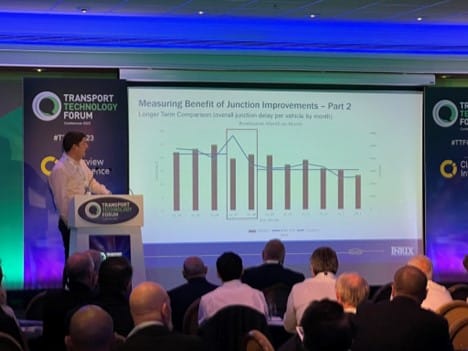
Traffic congestion has long been a major challenge in urban areas, negatively impacting the environment, economy, and overall quality of life. With the rapid growth of smart city solutions, traffic management and signal maintenance has become increasingly important. In this blog post, we will explore the environmental, social and mobility benefits from re-timing traffic signals, using data and analysis from specific junction improvements conducted by Hertfordshire County Council, UK.
INRIX presented at the Transport Technology Forum Conference in Leeds on the benefits resulting from the Department for Transport (DfT), funding for signal maintenance activities, under the “Traffic Signals Challenge,” a program that provided £250,000 to £500,000 to 39 Transport Authorities to improve movement at traffic signals.
The results reveal that by investing in traffic signal improvements, significant time savings can be achieved, therefore reducing delay and benefiting commuters, businesses, and the environment. INRIX Signal Analytics showed the following outcomes from improving flow at signals:
- Reduced fuel consumption and emissions: Smooth traffic flows mean less idling and fewer stop-and-go situations, which in turn lowers fuel consumption and reduces greenhouse gas emissions.
- Economic savings: Time savings translate to cost savings for businesses and individuals. With less time spent in traffic, the overall productivity of a city increases, boosting its economy.
- Enhanced quality of life: Less time spent in traffic leads to improved work-life balance and reduced stress for commuters. This contributes to a better overall quality of life for residents.
In one example, INRIX Signal Analytics revealed that signal delay per vehicle dropped from 22.9 seconds to 13.2 seconds at a junction after implementing signal retiming. With thousands of vehicles passing through a single junction daily, the time and environmental savings quickly add up:
Each week, 207 vehicle hours were saved at the junction, which equates to 1,190 pounds of CO2 and 48.9 gallons of petrol. Over the course of a year, this means more than 10,000 vehicle hours of delay will be eliminated, leading to 28 metric tons of CO2 avoided and more than 2,500 gallons of petrol – equating to £16,500 in savings to local drivers per year.
Overall, it was revealed that this analysis using the INRIX Signal Analytics gathered from a network of connected vehicles showed an overall 15-40% improvement on all junctions in Hertfordshire where signals improvements had been carried out to improve traffic flow.
Darren Capes, ITS Policy Lead, Department for Transport, posted on LinkedIn:
“The Transport Technology Forum conference in Leeds is hearing great news from Dominic Paulo of INRIX about signal analytics and its ability to show the benefits of traffic signal maintenance and upgrades to traffic flow.”
Improving traffic signal timing is a low-cost, high-benefit improvement that – until now – relied solely on physical infrastructure to gather and collect information. New software, like INRIX Signal Analytics, allows planners and engineers access to this information that is gathered, stored, and analyzed in the cloud, reducing implementation time and improving productivity.




